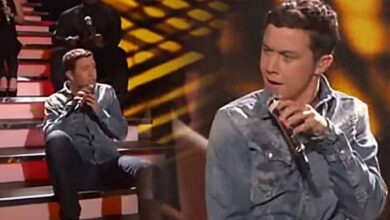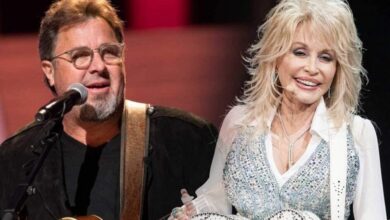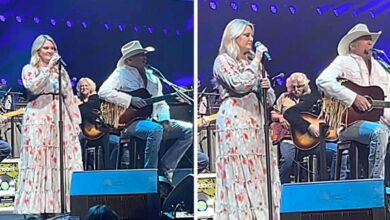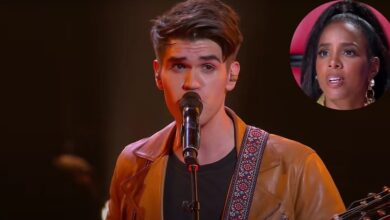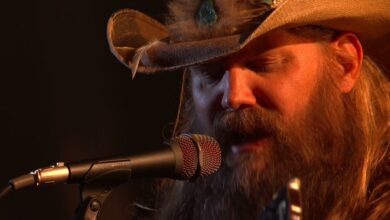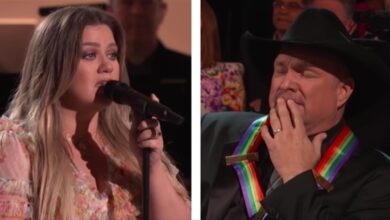During the Awards Ceremony, He Delivers a Stellar Performance, One of His Finest Yet
Conway Twitty’s “Hello Darlin'” is not merely a song; it is a cultural touchstone that has captured the hearts of countless listeners since its release in March 1970. The song achieved remarkable success, reigning atop the Billboard Hot Country Singles chart for four weeks, marking a significant milestone in Twitty’s already illustrious career. This achievement not only highlighted the song’s wide-ranging appeal but also established Twitty as a major force in the country music scene. The composition seamlessly blends a heartfelt narrative with a compelling melody, illustrating the complexities of love, longing, and regret that resonate universally.
At the core of “Hello Darlin'” is a narrative rich in emotion, expressing the bittersweet feelings associated with revisiting a past relationship. Listeners are drawn into the intimate world of the narrator, who reflects on memories intertwined with both joy and sorrow. Twitty’s velvety baritone voice brings a unique depth to the lyrics, making the experience of hearing the song akin to sharing a heartfelt conversation with an old friend. The iconic spoken introduction, “Hello darlin’,” sets the tone for the heartfelt story that unfolds, inviting audiences to share in the vulnerability and raw emotions expressed throughout the track.
The song’s lyrical ingenuity is matched by its melodic structure, which artfully captures the ebb and flow of the narrator’s emotions. The simplicity of the melody complements the complex emotional landscape navigated by the lyrics. This dynamic allows “Hello Darlin'” to appeal to listeners from different walks of life, reinforcing the idea that the struggle with love and loss is a shared human experience. The emotional weight carried by Twitty’s voice, paired with the evocative lyrics, fosters a lasting connection with listeners, making it a staple in country music for decades.
Critically acclaimed, “Hello Darlin'” garnered a Grammy nomination, a testament to its artistic merit beyond commercial success. Its impact extended beyond the charts, becoming an essential element of Twitty’s live performances. Often serving as the opening song at concerts, “Hello Darlin'” allowed Twitty to forge a deep connection with his audience. Fans would often sing along, creating a powerful, collective experience that showcased the song’s capacity to unify and resonate with people from diverse backgrounds.
The song’s enduring legacy is further illustrated by its myriad covers by artists across various genres. From traditional country singers to contemporary pop and rock artists, “Hello Darlin'” has been reinterpreted in numerous ways, each rendition reflecting the unique artistry of the performer while honoring Twitty’s original emotional depth. Such covers testify to the song’s transcendence; its themes remain relevant and relatable, proving that great songwriting endures through changing musical landscapes.
Conway Twitty, originally born Harold Lloyd Jenkins, had a prolific career that spanned several decades and genres. Before discovering his passion for country music, Twitty achieved success with rock and roll hits like “It’s Only Make Believe” in the 1950s. It was his pivot to country music in the late 1960s that solidified his status as a legendary figure within the genre. Twitty’s distinct blend of pop and country, characterized by his rich baritone voice, resonated deeply with audiences and earned him numerous accolades, including multiple CMA and ACM awards, all contributing to his lasting influence on American music.
The release of “Hello Darlin'” not only marked a pinnacle in Twitty’s career but also shaped the trajectory of country music in the 1970s. The song’s success paved the way for an array of hits and notable collaborations, including Twitty’s iconic duets with fellow country star Loretta Lynn. Classics such as “Louisiana Woman, Mississippi Man” highlighted his exceptional ability to harmonize with other artists, elevating the genre and showcasing the power of vocal duets in country music.
Twitty’s connection to “Hello Darlin'” extends beyond its commercial success; it encapsulates his talent for storytelling through song. The narrative of the song continues to evoke nostalgia and emotion, resonating with both new listeners and long-time fans. Each performance of “Hello Darlin'” serves as a reminder of Twitty’s craftsmanship and his deep understanding of human emotions, securing the track’s place as a cherished classic.
In the broader context of country music, “Hello Darlin'” exemplifies the genre’s hallmark traits: storytelling, emotional honesty, and relatability. Its success and continued relevance among audiences exemplify how great music can transcend time and trends, making it a timeless piece of art that speaks to the human condition. The legacy of Conway Twitty and “Hello Darlin'” is a testament to the enduring power of music to capture life’s complex emotions, ensure connections among people, and create indelible memories.
As we look back at the rich tapestry of American music history, the contributions of Conway Twitty, particularly through “Hello Darlin’,” remind us of the profound ability of songwriters to capture the essence of experience in ways that resonate across generations. The emotional depth and relatability of this iconic ballad continue to captivate the hearts and minds of listeners, ensuring that Twitty’s artistry will be celebrated for years to come.
&ab_channel=BCOJR
